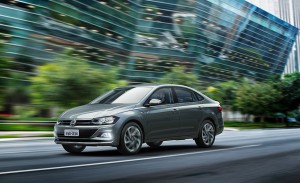Brazil has been something of a conundrum for automakers.
It is one of the world’s largest automotive markets, but the country’s economy was in the doldrums until this year. So as carmakers waited for the country’s economy to come back to life, they settled for a long game that has pushed the return on investment out into the future.
General Motors elected to hold on to its Brazilian business despite losses that would have seemed to have put the operations on the chopping block just like Opel.
Fiat Chrysler Automobiles N.V. basically ignored the country’s economic downturn as it invested in a plant that now builds new Jeep Compass, making Brazil one the cornerstones of its ambitious effort to expand sales of the Jeep brand.
(VW investing over $40B on EVs, autonomous vehicles. For the story, Click Here.)
Now Volkswagen AG, fresh from new commitments in China, has announced plans for a model for the Brazilian market. The new Virtus model from VW was designed to tap Brazil’s highest-volume segment as part of a recovery plan that analysts said will help it regain ground on rivals General Motors and Fiat in what is far and away South America’s largest car market.
Volkswagen said the launch of the new model in Sao Paulo was part of a plan to spend about $2.12 billion to roll out as many as 20 new models in Brazil by 2020.
Returning to profit in markets such as Brazil, the United States and Russia is vital for Volkswagen as it pushes to revive the core VW brand that accounted for more than half the group’s 7.8 million auto sales in the first nine months but only 19% of underlying profit.
Last week, VW announced a $600 million investment in neighboring Argentina to build the first sport-utility vehicle (SUV) in Brazil’s neighbor.
The goal of the ambitious investment is to make VW profitable again in Brazil and the rest of South America. “We will do everything possible in coming years to win back the leading position of VW” in Brazil, VW brand sales chief Juergen Stackmann told Reuters.
(For more on VW’s EV truck plans, Click Here.)
After a restructuring that eliminated 7,000 jobs in South America and downsized its dealer network, VW plans to reduce the average age of the brand’s Brazilian line-up to less than five years by 2020 from eight years in 2015.
To cut costs and be able to lower prices, VW fully developed the Virtus in Brazil, giving proof of its post-dieselgate strategy to cede more power from its Wolfsburg headquarters to regions and brands.
VW admitted in September 2015 that it had used illegal software to cheat U.S. diesel emissions tests, sparking the biggest business crisis in its 80-year history. So far, the scandal has cost VW more than $30 billion.
The new four-door Virtus, to be built at Anchieta near Sao Paulo, is one of the first cars to be spawned from a new localized version of the MQB modular platform that underpins most of the VW group’s small and medium front-wheel-drive models.
With the new vehicles, VW brand sales of passenger cars and light commercial vehicles in Brazil could increase by as much as 44% to 413,776 units by 2023 from an estimated 286,745 next year, according to an estimate by IHS.
(To see more about VW’s Chinese plans, Click Here.)
Volkswagen’s competition in Brazil, according to IHS estimates, Fiat sales are expected to grow 26% to 475,686 cars and Chevrolet jumping 18% to 444,744 models.


